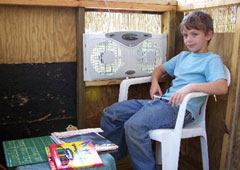Jumping Off a Cliff Into Homeschooling

Homeschooling an SPD child. What's it all about? If the teacher in public school is having such a hard time, how can a parent possibly handle it? How indeed?
The face of homeschooling is changing. No longer are children hidden in the house afraid they will be reported. On the contrary, homeschoolers have very boldly come outside where we see them everywhere! Support groups are forming, maybe even in your neighborhood. Parents and children gather for socialization at local parks and playgrounds. Businesses are realizing the marketing potential and are opening their doors wide on week days for homeschool field trips and events. Families are taking advantage of the wonderful educational opportunities at reduced prices and arriving in ever-growing groups.
What is homeschooling an SPD child like? Wonderful, challenging, rewarding, fun, inspiring, and above all fulfilling. It can be an amazing life change for stressed, overwhelmed children who struggle to fit in and conform with group expectations, to children who explode with potential.
Granted, homeschooling is not for everybody. Most parents believe they wouldn't have the patience, they wouldn't know where to begin. I was one of those parents. Even considering the possibility of homeschooling made me feel the vertigo of looking over a giant cliff into... what? I didn't know.
I decided to learn a little bit about this. I wasn't ready to make any huge life altering decision quite yet. Oh no! I looked up the laws of my state concerning homeschooling. I asked around and found several homeschooling groups within my county. I met with families, and asked pointed questions like: "How can you stand it? Where would I get curriculum?"
And then I began my own research, while worrying I would ruin my child forever if I did such a thing. The day I finally decided I would withdraw my son from the public school system, I was confident I could at least do no worse than his public school. I was not sure yet if I could do better.
Day one: my son, Michael wanted to name our new school and define new rules.
"Rule number one," my seven-year-old stated, "children will be allowed to take as much time as they need to do their work. No punishing if they are not fast enough!" Gulp. I knew my child had been punished with no recess when he couldn't complete assignments as quickly as other children. Yes, good rule, and one I can live with. You get as much time as you need, when you homeschool.
"Rule two, children will always be allowed to use the restroom when they need to." Of course. We add that one. "Rule three, children will take movement breaks when they need to, so they can work better, Mom!" Oh, of course we can! Now we can, yes! "And rule four, I want to learn more than before. I want Science! I want more Art! I want, well... more."
More? He asks for more, when I am worried about getting the basics into him? And from that moment we began the most amazing new adventure. For every sensory processing challenge my boy faced and conquered with therapy, we see an equal gift. Like many children with processing deficits, my son struggles with language processing commonly called dyslexia. We added a multi sensory approach to learning to read and write and he is gaining proficiency. In the first six months of homeschooling Michael devoured two curriculum years of Science. Geography is interesting to him and he loves it. Social Studies are enhanced by frequent field trips to museums and archeological sites. He attended a two week Art Camp, has joined our local Chess Club, took swimming lessons and plays on a soccer team.
Many parents are concerned about socialization. I was also. But the reality is that when your child is free to socialize with children and adults of every age, and permitted to join clubs and groups of interest to him, a parent may find they need to slow down with all that socialization. We now have designated school days, weekly field trips, and regular group outings. Given the chance and inspiration to learn, the children quickly realize that learning is fun. Their library can become their favorite place.
I have learned several lessons this past year. Children have an innate desire to learn and will do so, if we provide the stimulus in a way they can learn best. I have discovered that children continue to learn, even when we are not actively teaching. And I have realized that my own child has more potential than I ever thought possible. I wouldn't trade these days with my son for anything.
If a parent is still wondering if homeschooling would be best for their child, consider this: who taught your child before they ever started school? Who knows what your child needs, and how best to teach them, than you? I never once thought I could be my son's best teacher, until I became his favorite teacher.
If you are interested in learning more about homeschooling your child, look up the laws of your state. They do vary in requirements. Then find a local group and meet other families. Parents are a wonderful source of information, and can answer many concerns. If you cannot find a group, or none exists in your county, leave a flyer at your local Occupational, Speech and Physical Therapist clinics offering to meet with other homeschool families, and start your own group!

A multi sensory approach to learning is good for any child, but possibly essential to children with Sensory Processing Disorder. Purchasing curriculum need not deplete your savings. In our community, we have Homeschool Curriculum Fairs, where a parent may obtain progressive studies for a fraction of the original selling price. Call your local school board to pick up unused books, desks and class furnishings schools no longer need. With more than 2500 curriculum choices on the market right now, it can be confusing to choose which would be best for your child. My advice? Choose what is best for your family. Each homeschool is a reflection of a family's beliefs and style. There is no "one way" required. You may be more comfortable with a curriculum-in-a-box. My caution is the expense, and that your child may very quickly move from one grade to another in subjects they love, and need more time spent on challenging subjects. You can easily find hundreds of online free sources of educational materials, worksheets, Internet field trips, and projects.
If you hit a snag, and your child is not responding well to the curriculum you have chosen, try presenting the same material in another sensory way. Use auditory, visual and tactile input to learn. Use "hands on" learning, followed by worksheets once you know they understand the material. Success builds more success, and when a child is homeschooled, they have the opportunity to experience the absolute best education it is possible to have.
From a parent who never once considered homeschooling, until the day I became a happy homeschool parent, I offer this thought to you: It is the best gift I have ever given my child. A gift of my time, my understanding, and my compassion. When I jumped off the cliff into homeschooling, I found it was no fall at all. Just a step.
This article was published in the Spring 2006 issue of S.I. Focus Magazine.